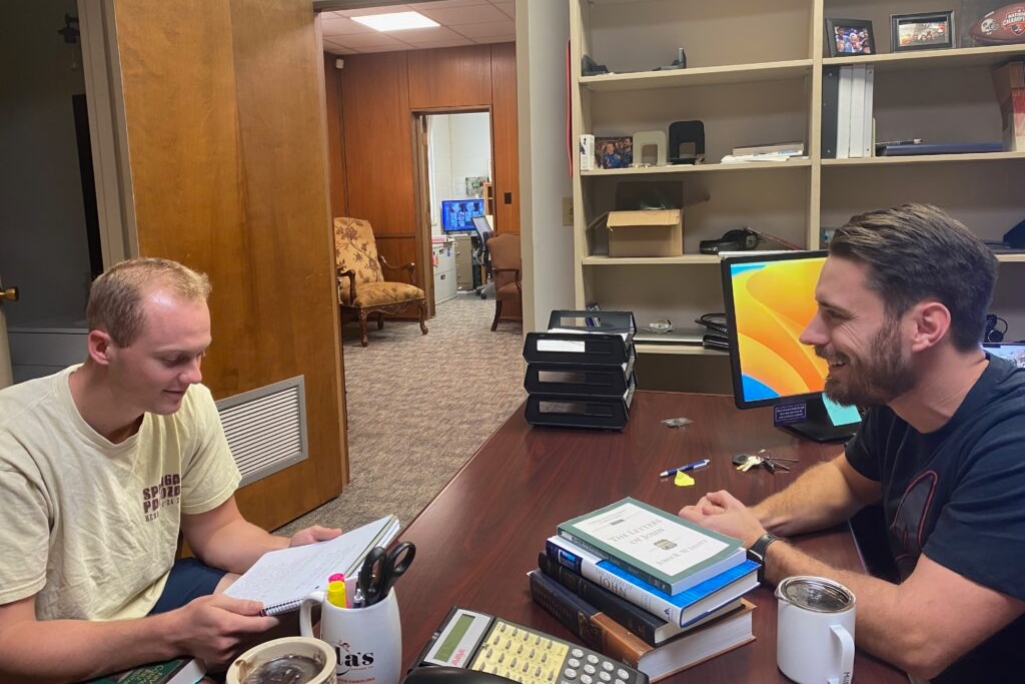
At right Tyler Armstrong, pastor of Woodward Avenue Baptist Church in Muscle Shoals, Ala., meets with Nate Kemble, who is part of the church's preaching cohort and will be preaching at his church, Woodmont Baptist, on Sunday.
MUSCLE SHOALS, Ala. (BP) — Having worked in churches, Tyler Armstrong knows the benefit of staff members spending time together to achieve ministry cohesion. Starting in his first pastorate, though, he has experienced how challenging that can be when you’re the only fully-funded staff position.
The other staff members at Woodward Avenue Baptist Church hold different jobs, from brokering freight at a trucking company to working in a college admissions office. Other than the director of senior adults – who is also a retired nurse – the rest are in their 30s with children.
“I’d like to find ways to foster a stronger sense of community,” Armstrong said, “for us to stay in touch with each other [to] kind of create a cohesiveness in vision.”
Work and family schedules make weekly meetings extremely difficult. He took the question to an online Facebook group and received suggestions like quarterly meetings with staff and families, regular texts, check-ins before scheduled services and monthly potluck gatherings.
Armstrong has been thinking through them all. As far as he knows, it’s the first time in his church’s history that there was only one fully-funded position. It’s also a first for him, having only served in churches with multiple such roles.
“I’m looking at this wondering how to navigate it, because I’ve never been here,” he said.
Approximately two-thirds of Southern Baptist churches average fewer than 75 people for Sunday worship, said Joe Wright, executive director of the Bivocational & Small Church Leadership Network (BSCLN). The overwhelming majority of those churches will be led by bivocational pastors.
Church staff in such positions actually have three jobs, he said.
“They do not function in the same was as a fully-funded staff, who tend to have more time for meetings,” said Wright, the bivocational pastor at Three Rivers Fellowship in Waverly, Tenn.
“Bivocational ministers first have their sacred job, their ministry. Then they have their secular obligation. On top of that, they are taking care of their family. They’re balancing three things, so it’s hard to have a traditional staff meeting schedule.”
Wright gives five suggestions for a church staff of bivocational ministers to maintain a sense of fellowship and unity.
Piggyback on scheduled gatherings. Other job obligations limit excess time for bivocational ministers. Have “focused” meetings following Sunday or Wednesday services. If more time is necessary, schedule these quarterly or monthly.
Keep things consistent. Regular meetings bring a sense of teamwork and should include thoughtful interaction and discussing shared responsibilities. Keep the agenda true to its original purpose. If the purpose is fellowship, avoid talking shop as best you can.
Plan an annual retreat. These can be especially beneficial for bivocational staff members to pray, plan and program. Inviting families can make it even better.
Make it personal. Pastors who are fully funded need to be willing to invest in meeting each bivocational staff member individually. It exhibits support as well as respect.
Honor them publicly. Taking the time to recognize bivocational staff in front of the church encourages everyone. It gives worth to their calling in ministry and encourages them in their service. Financial gifts and quiet words of wisdom also go a long way.
And when talking about bivocational ministry, avoid using the misnomer “part-time” to describe the time commitment. There is no such thing for the model of ministry of most Southern Baptist churches.
For many other churches, the number of staff funded at all is … one. Robert Blackmon, lead pastor of Bluegrove Baptist Church in Henrietta, Texas, works with a staff of volunteers.
The church averages 70 most Sunday mornings. The nearest Walmart is 35 miles away. There are no weekly staff meetings.
The 31-year-old Blackmon has been serving on church staffs since he was 16, 12 if you count that time he was hired to clean the church vans. He has served at churches of all sizes in various roles.
To build cohesion when time to do so seems lacking, he said it’s important to maximize what you do have. Smaller, intimate churches have that advantage.
“I make the most of time we’re naturally around each other,” Blackmon said. “My wife and I invite them to our home for a meal, which I’d take any day over going out to eat. You grow closer to people in that setting.”
That option is something Armstrong has considered as well.
“We’ve thought about doing that perhaps once a quarter,” he said. “It’s another connection point.”
(EDITOR’S NOTE – Scott Barkley is national correspondent for Baptist Press.)


